Looking to transform your outdoor space but feeling limited by size? Small gardens hold incredible potential for creating stunning, functional environments that maximize every square inch. Whether you're working with a tiny balcony, narrow side yard, or compact patio, the key lies in smart design choices and creative solutions. Today's small garden trends focus on vertical growing, multi-functional elements, and sustainable practices that deliver big impact in minimal space. From herb-filled containers to living walls, these compact gardens can provide fresh produce, beautiful blooms, and peaceful retreats right at your doorstep. The beauty of small-scale gardening is its flexibility – you can experiment with different styles, move elements as needed, and create personalized spaces that reflect your lifestyle and preferences without overwhelming maintenance requirements.
1. Vertical Living Wall Gardens
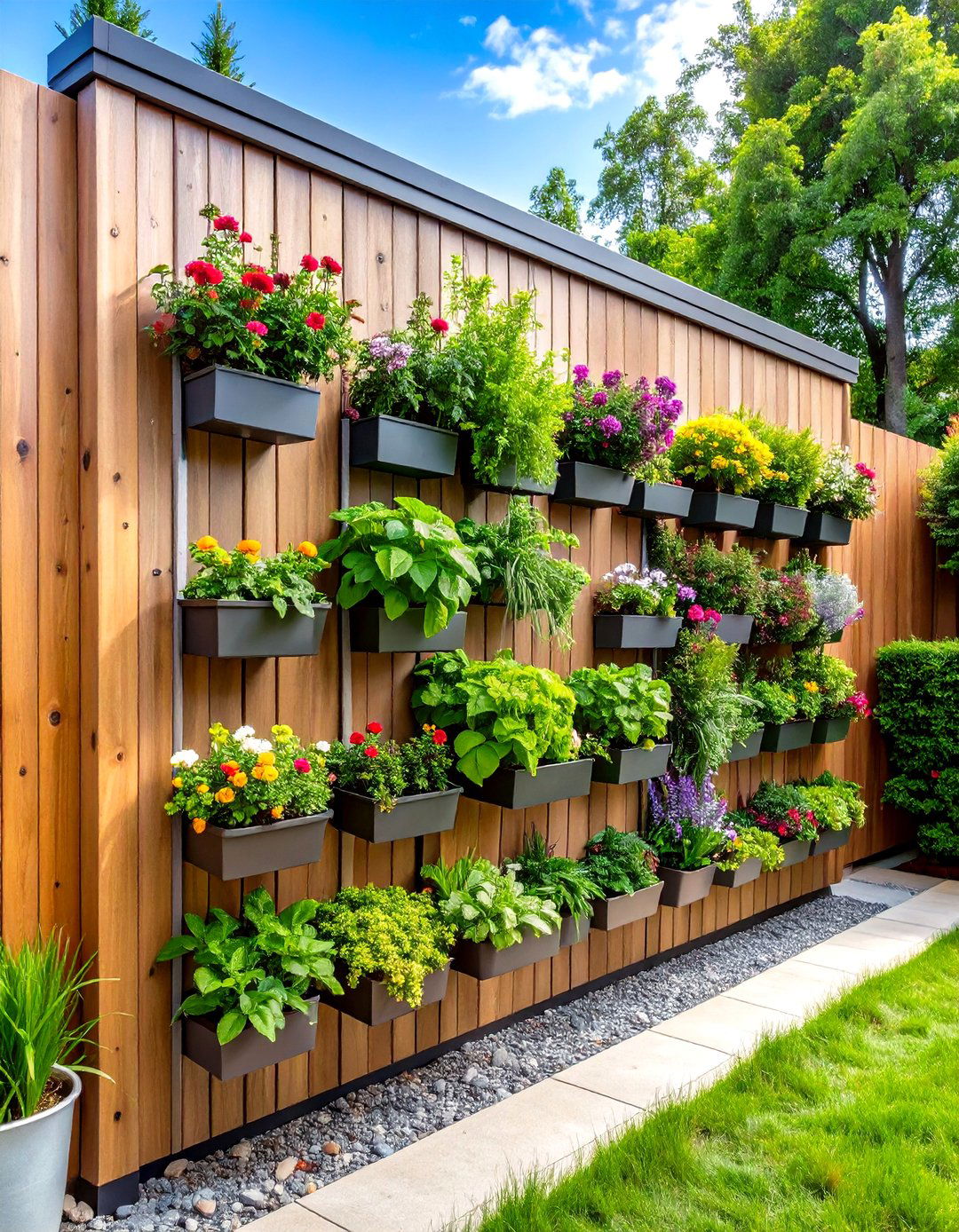
Could your bare fence become a thriving garden paradise? Vertical living walls transform unused wall space into lush green displays that maximize growing potential without consuming precious ground area. These systems use modular planting pockets or mounted containers to create stunning plant arrangements that can house everything from succulents to herbs and flowering plants. Install irrigation systems to ensure even water distribution, and select plants with similar light requirements for best results. This approach works perfectly for rental properties since most systems mount without permanent modifications. Vertical walls also provide natural insulation, reduce noise, and create striking focal points.
2. Container Herb Gardens

Why purchase expensive herbs when you can grow abundant supplies in simple containers? Container herb gardens offer the perfect introduction to small-space growing, requiring minimal investment while delivering maximum culinary rewards. Choose containers at least six inches deep for shallow-rooted herbs like thyme and oregano, while deeper pots accommodate basil and parsley. Group containers with similar watering needs together, and position them near your kitchen for convenient harvesting. Terra cotta, cedar, and food-grade steel containers work beautifully. These portable gardens can move indoors during harsh weather, extending your growing season and ensuring fresh herbs year-round for cooking adventures.
3. Hanging Basket Food Gardens

What if your ceiling space could produce fresh vegetables and trailing herbs? Hanging basket gardens utilize overhead areas to grow strawberries, cherry tomatoes, lettuce, and cascading herbs like trailing rosemary. Select sturdy hooks and lightweight containers with excellent drainage to prevent water damage. Position baskets where they receive adequate sunlight while remaining accessible for harvesting and maintenance. This method works exceptionally well for balconies and covered patios where floor space is premium. Consider installing pulley systems for easier watering and harvesting. The visual appeal of productive hanging gardens creates beautiful living decoration while supplying fresh ingredients for your kitchen.
4. Tiered Raised Bed Systems
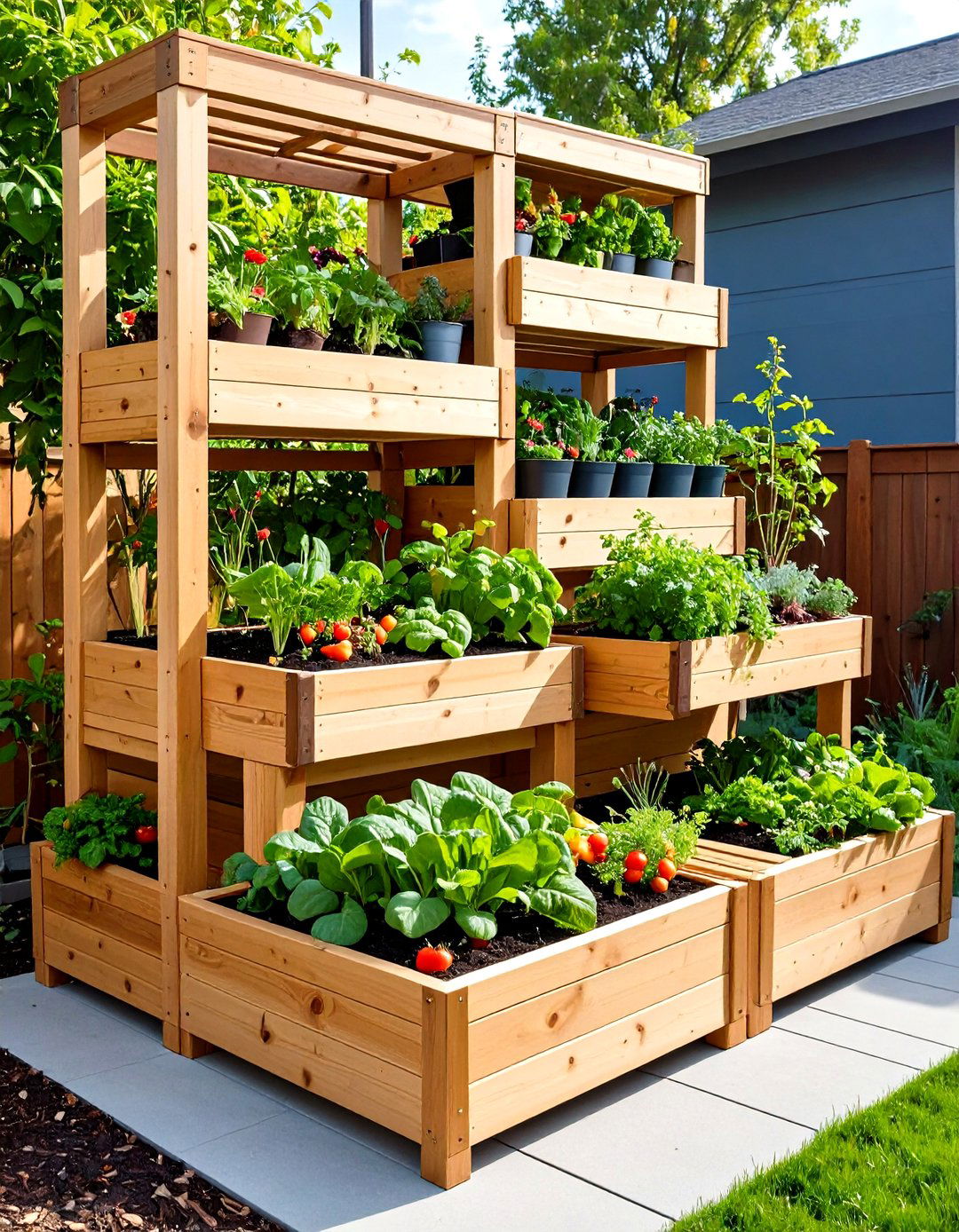
Can you triple your growing space without expanding your garden footprint? Tiered raised bed systems create multiple growing levels that maximize production in compact areas. Build or purchase stepped planter boxes that provide different sun exposure zones – upper tiers for sun-loving vegetables and lower levels for shade-tolerant plants. This design offers excellent drainage, easier harvesting, and organized growing areas for different plant families. Cedar or composite materials ensure longevity, while proper spacing between tiers allows adequate light penetration. These systems work particularly well for vegetables, herbs, and flowers, creating attractive garden landscapes that provide abundant harvests from minimal ground space.
5. Window Box Vegetable Gardens

Could your windows become productive growing spaces that brighten both indoor and outdoor views? Window box gardens transform ordinary windows into productive growing areas perfect for lettuce, herbs, radishes, and compact flowers. Install secure mounting brackets that support the weight of soil and mature plants, ensuring proper drainage to protect your home's exterior. Choose boxes made from weather-resistant materials like cedar or powder-coated metal. These gardens provide easy access for daily harvesting and maintenance while adding charming curb appeal to your home. Window boxes work especially well for kitchens, allowing you to harvest fresh ingredients while cooking without stepping outside.
6. Pallet Vertical Planters

Have you considered transforming discarded pallets into stunning vertical garden displays? Pallet planters offer budget-friendly solutions for creating impressive growing walls using reclaimed materials. Sand and seal pallets, then add landscape fabric backing and install pocket planters or small containers between slats. These systems work wonderfully for herbs, succulents, and trailing plants that create cascading effects. Position against fences, walls, or as freestanding garden dividers. The rustic aesthetic complements many garden styles while providing substantial growing space. Ensure pallets are heat-treated rather than chemically treated for food safety. This upcycling approach combines sustainability with functionality for environmentally conscious gardeners.
7. Square Foot Intensive Gardens
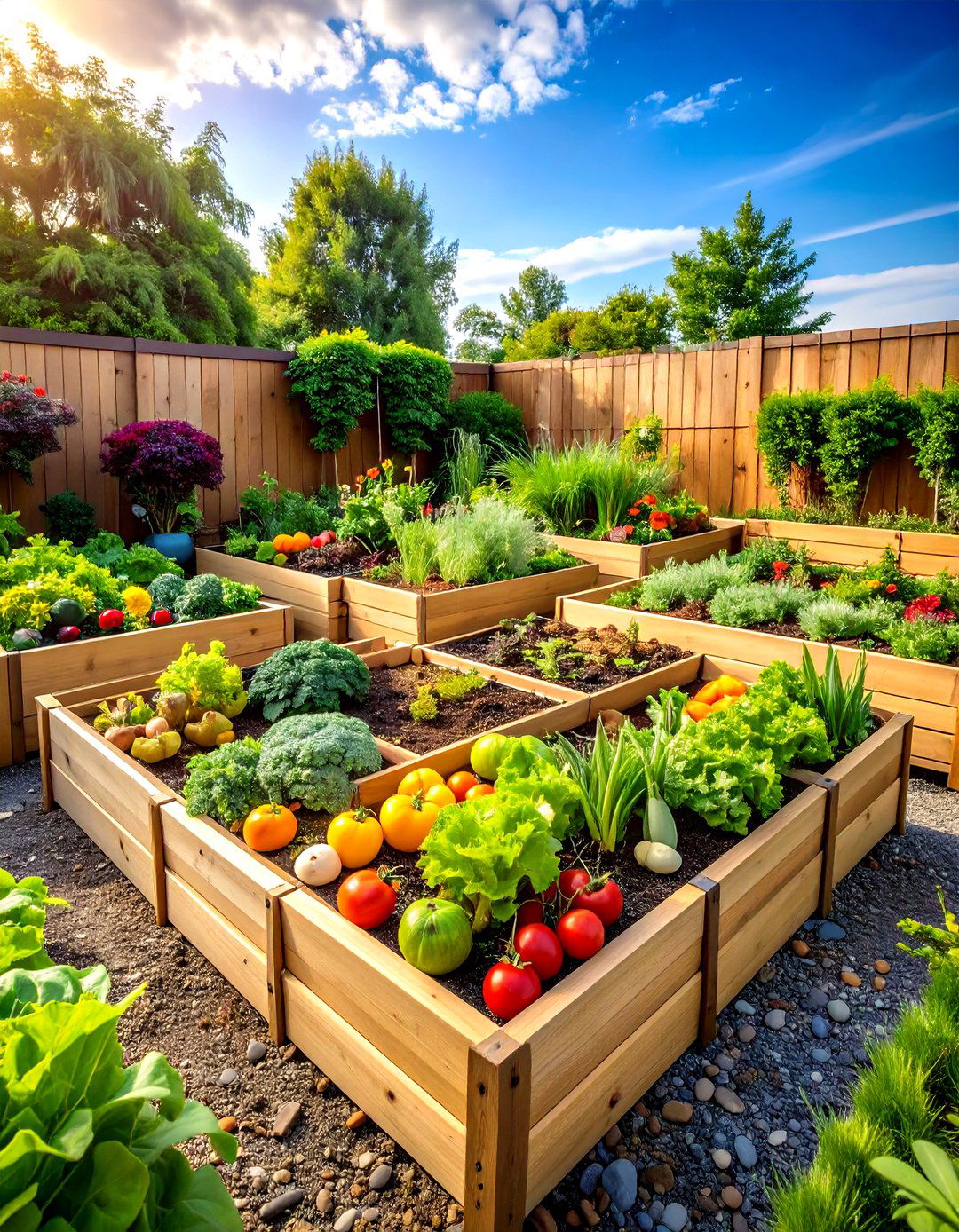
Why settle for traditional row gardening when you can maximize every inch with precision planning? Square foot gardening divides growing areas into one-foot squares, each planted with specific quantities of vegetables or herbs based on mature plant size. This method eliminates weeds, reduces water usage, and maximizes yields in minimal space. Build raised frames four feet wide for easy access from all sides, and fill with quality soil mix combining compost, peat, and vermiculite. Grid systems help maintain organization and proper spacing. This approach works exceptionally well for beginners, providing clear guidelines for plant placement while ensuring productive harvests from small garden areas.
8. Balcony Container Gardens
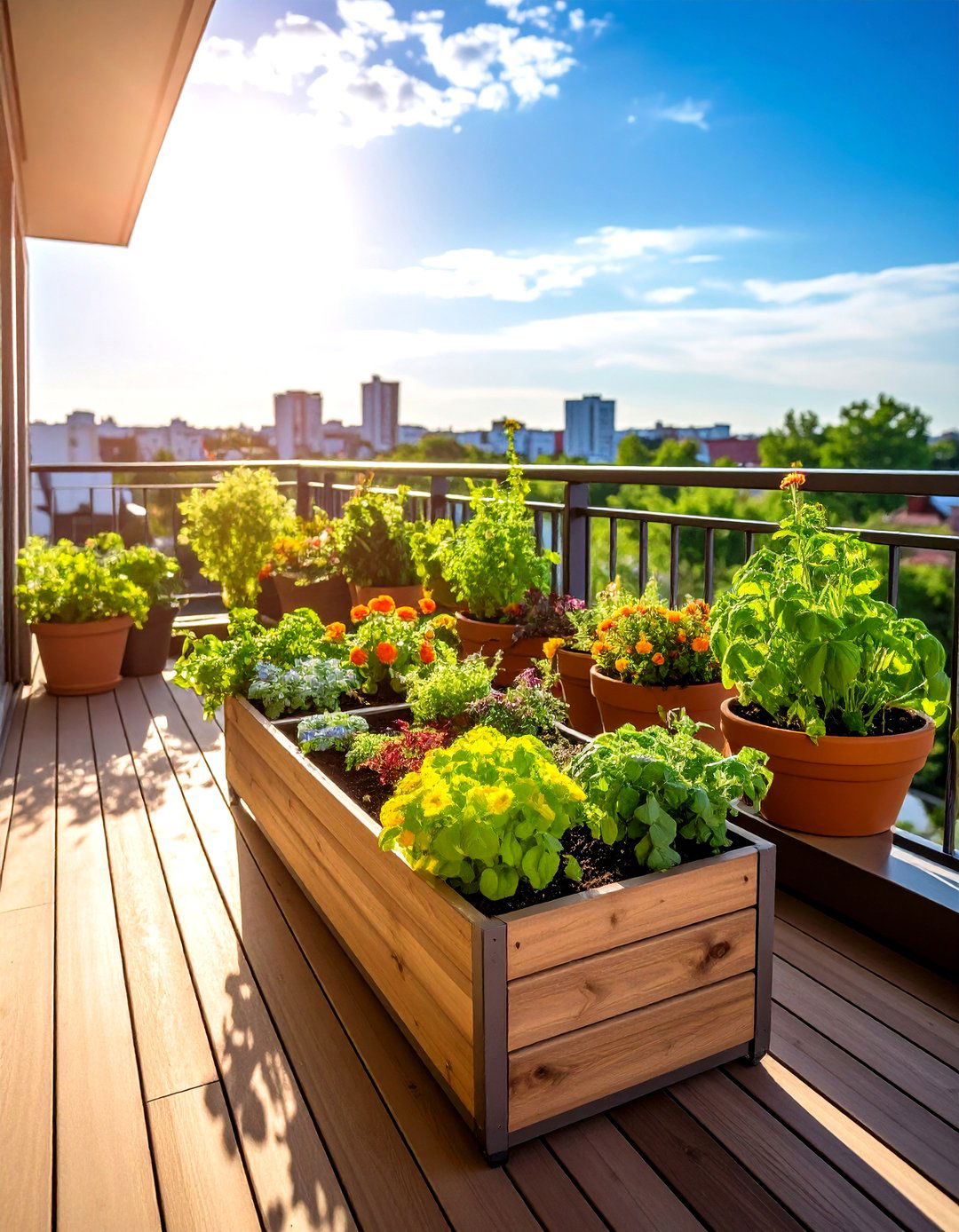
Can small balconies really support productive gardens that provide fresh food and beautiful flowers? Balcony container gardens prove that minimal space doesn't limit growing potential when you choose appropriate plants and containers. Select lightweight pots to avoid structural stress, and position plants according to sun exposure patterns throughout the day. Wind exposure requires securing containers and choosing sturdy plants that tolerate breezy conditions. Install trellises for vertical growing and use rolling plant caddies for easy repositioning. These gardens provide urban dwellers with private green spaces that offer respite from city life while producing fresh herbs, vegetables, and flowers.
9. Trellis Climbing Gardens
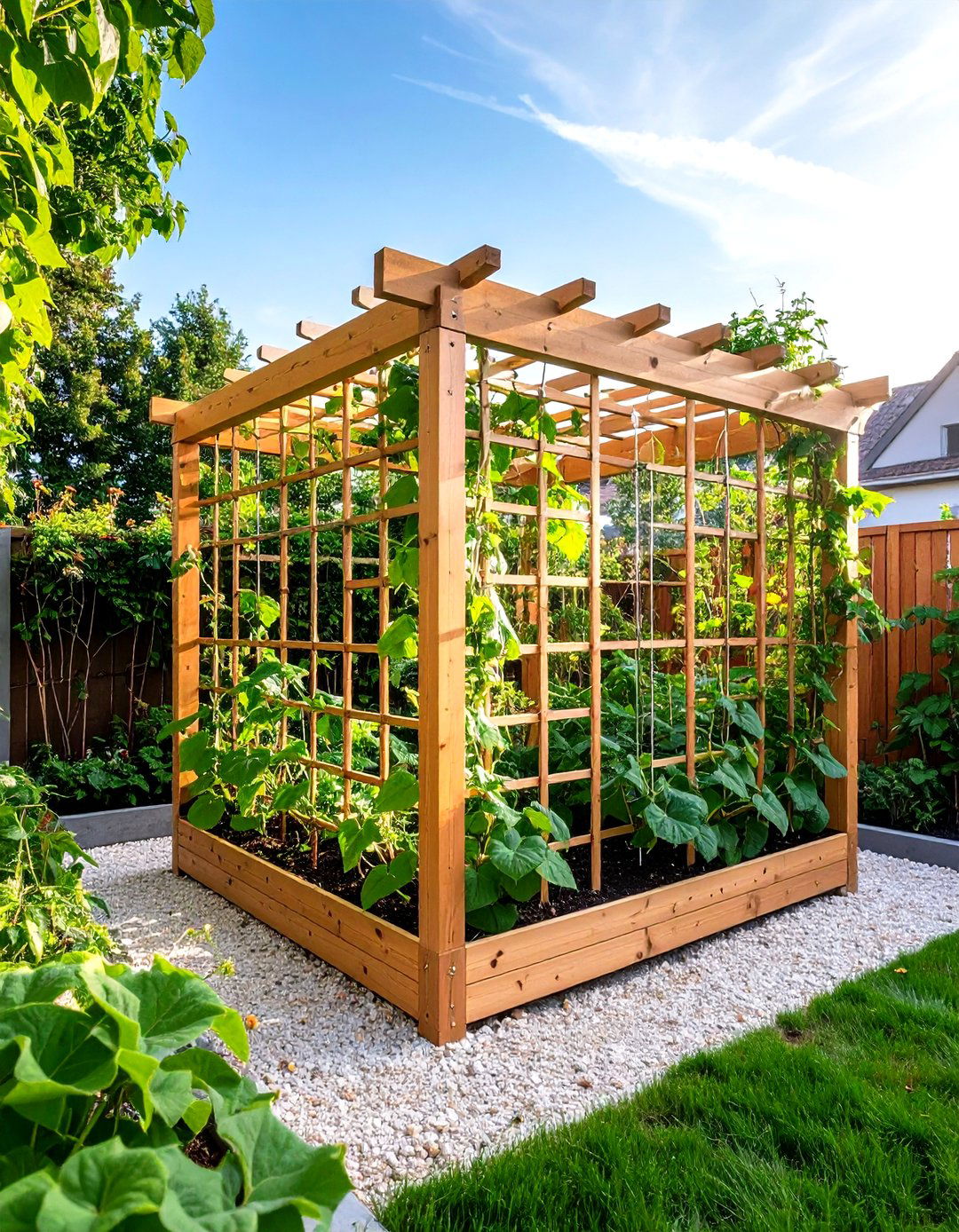
Could your vertical space support pounds of fresh vegetables without expanding your garden footprint? Trellis climbing gardens train vining plants like beans, peas, cucumbers, and squash to grow upward rather than sprawling across ground areas. Install sturdy support structures using wood, metal, or string systems that accommodate plant weight as vegetables mature. This approach dramatically increases yield per square foot while improving air circulation and reducing pest issues. Position trellises to avoid shading shorter plants, and harvest regularly to encourage continued production. These systems work beautifully in both containers and garden beds, providing architectural interest while maximizing food production.
10. Succulent Rock Gardens
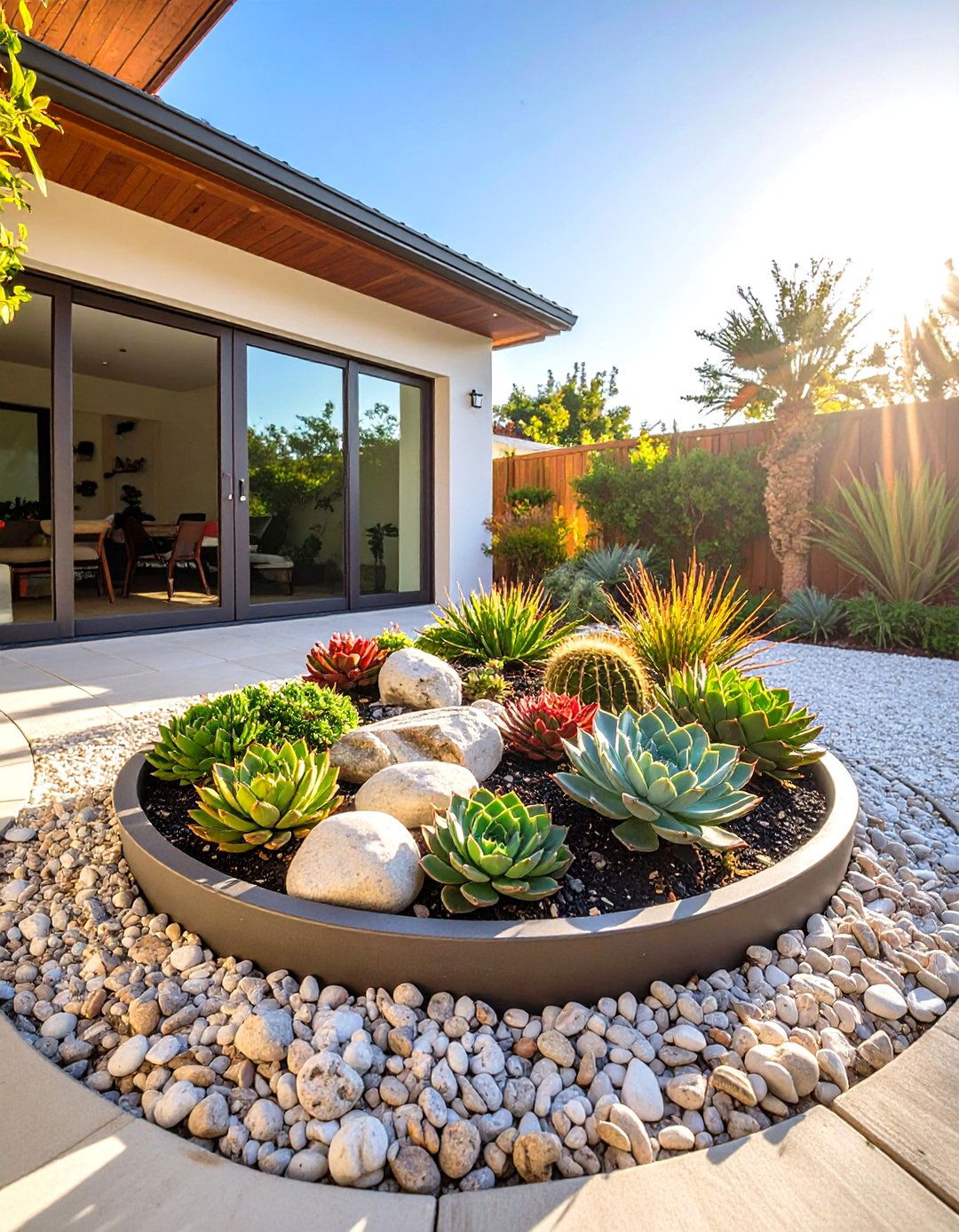
Are you seeking low-maintenance beauty that thrives in challenging small spaces with minimal water? Succulent rock gardens combine drought-tolerant plants with decorative stones to create stunning, water-wise landscapes perfect for sunny locations. Layer different succulent varieties by height and color, incorporating gravel mulch and attractive rocks for visual interest. These gardens require minimal watering once established and provide year-round color and texture. Choose containers with excellent drainage, and select succulent varieties suited to your climate zone. This approach works exceptionally well for busy gardeners who want beautiful spaces without intensive maintenance requirements while creating impressive focal points.
11. Rain Barrel Garden Systems
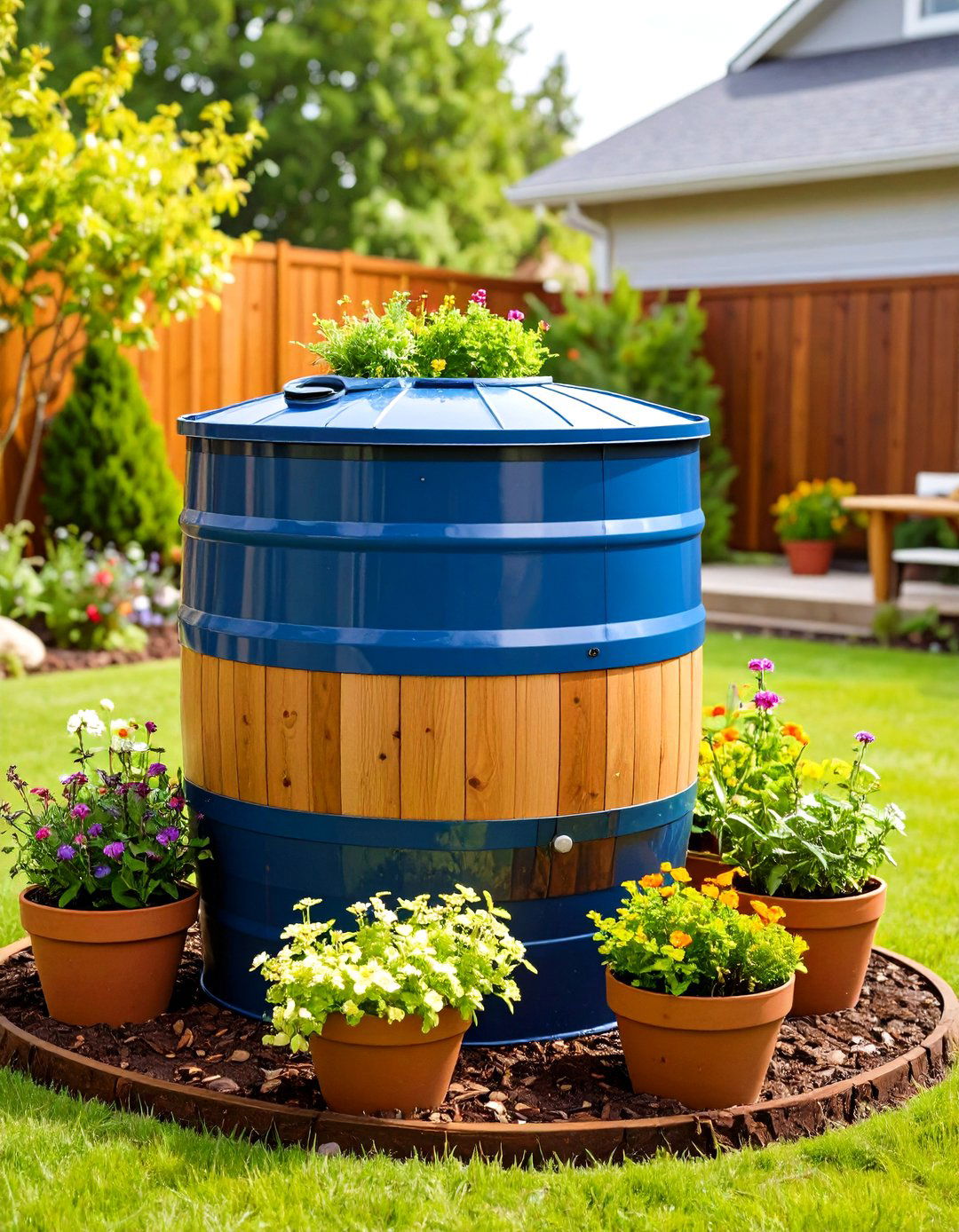
What if your small garden could capture and utilize rainwater while supporting productive plant growth? Rain barrel garden systems combine water conservation with container growing, using collected rainwater to irrigate elevated plant displays. Position barrels to catch roof runoff, then use gravity-fed irrigation or manual watering systems to nourish nearby containers. Build stepped platforms around barrels to create multiple growing levels while maximizing space efficiency. These systems reduce water bills while providing sustainable growing solutions. Choose food-grade barrels and install proper screening to prevent mosquito breeding. This approach demonstrates environmental stewardship while creating productive small-space gardens that thrive with minimal municipal water usage.
12. Edible Flower Borders

Could your small garden provide both stunning visual appeal and delicious culinary ingredients in one beautiful design? Edible flower borders combine ornamental beauty with practical harvests, using plants like nasturtiums, calendulas, violas, and marigolds to create colorful garden edges. These flowers add vibrant colors and unique flavors to salads, desserts, and beverages while attracting beneficial pollinators. Plant in containers or border areas where their trailing habits can cascade over edges for maximum visual impact. Many edible flowers are easy to grow and self-seed for continuous blooms. This approach proves that productive gardens can be gorgeous while providing ingredients for creative cooking.
13. Miniature Greenhouse Gardens

Have you imagined extending your growing season while protecting delicate plants in your compact garden space? Miniature greenhouse gardens use small cold frames, hoop houses, or table-top greenhouses to create protected growing environments for year-round production. These structures allow earlier spring planting and later fall harvests while protecting plants from harsh weather. Choose portable designs that can move with seasonal sun patterns or fold away when not needed. Start seedlings indoors for later transplanting, or grow cool-season crops throughout winter months. These systems prove especially valuable for herbs and leafy greens that provide fresh ingredients when outdoor growing conditions become challenging.
14. Pollinator Paradise Containers

Could your small garden become a vital habitat that supports bees, butterflies, and other beneficial insects while providing beautiful blooms? Pollinator paradise containers focus on native flowering plants that provide nectar and pollen throughout growing seasons. Choose plants like cosmos, zinnias, black-eyed susans, and native wildflowers that bloom at different times for continuous food sources. These gardens support local ecosystems while reducing pest problems in nearby vegetable gardens. Group containers of varying heights to create diverse habitat layers, and include plants that provide seeds for birds. This approach demonstrates how small spaces can make significant environmental contributions while creating beautiful, low-maintenance garden displays.
15. Shade Garden Containers
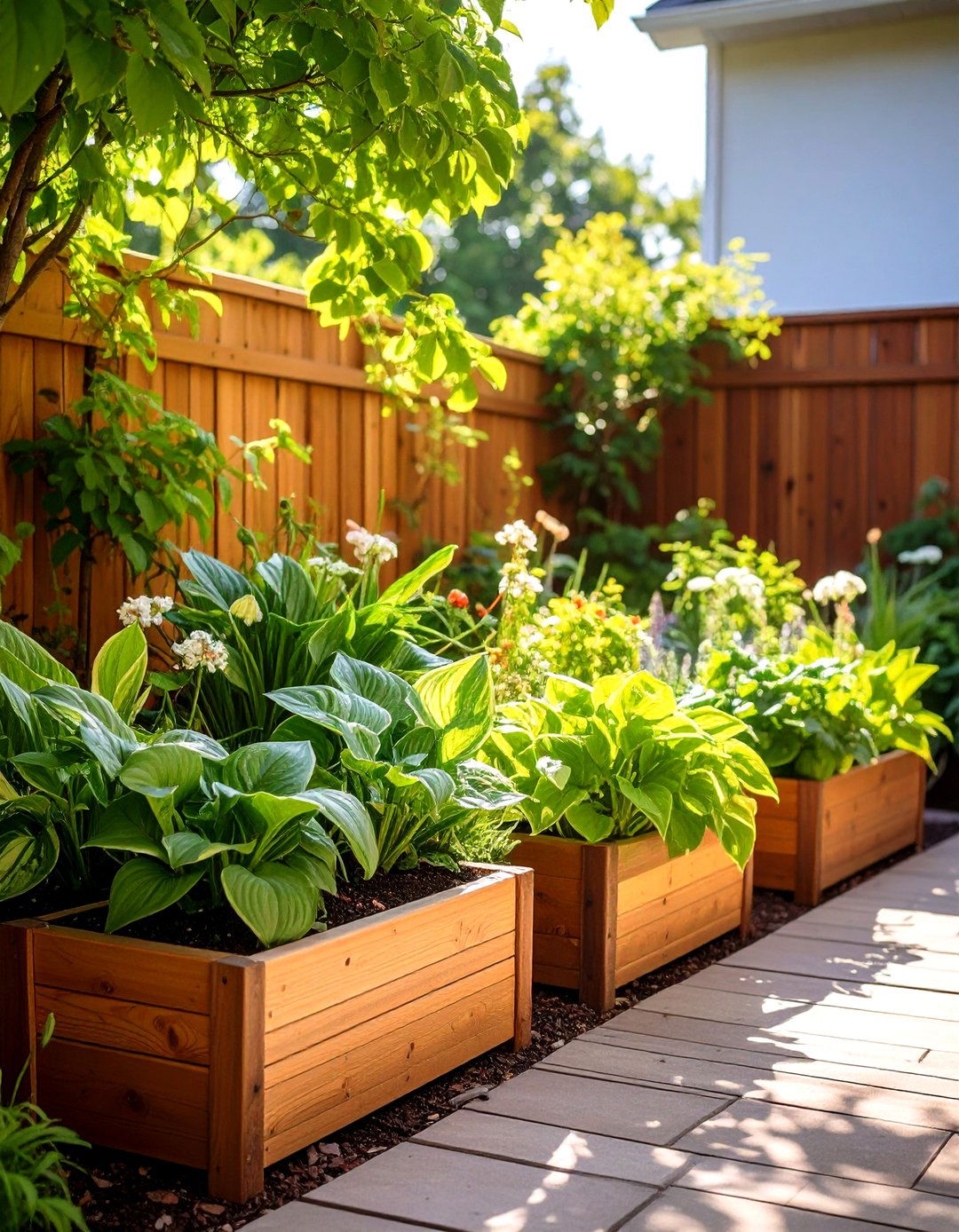
Why let limited sunlight prevent you from creating lush, productive garden spaces filled with beautiful plants? Shade garden containers utilize areas with partial or full shade to grow leafy greens, herbs, and ornamental plants that thrive in lower light conditions. Choose plants like lettuce, spinach, kale, mint, and hostas that actually prefer protection from intense sun. These gardens work perfectly for north-facing patios, under tree canopies, or along building sides. Use lighter-colored containers to reflect available light, and consider adding solar-powered LED grow lights for supplemental illumination. This approach proves that every space has growing potential regardless of sun exposure limitations.
16. Ladder Garden Displays
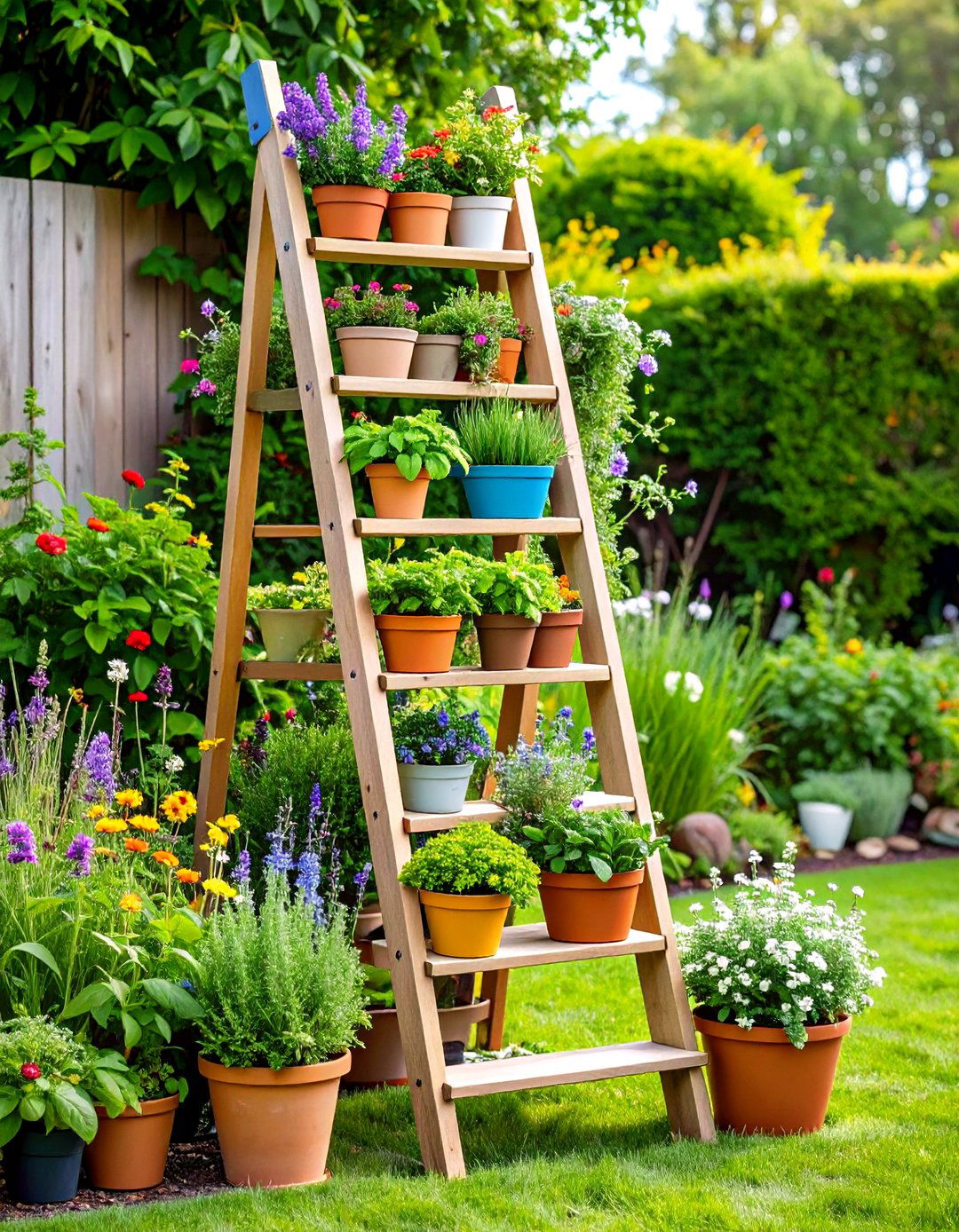
Could repurposed ladders create stunning vertical garden displays that showcase plants while maximizing growing space? Ladder garden displays transform old step ladders into charming plant stands perfect for herbs, flowers, and small vegetables. Secure containers to each rung, ensuring proper drainage to protect the ladder structure. These portable gardens can move to follow sun patterns or be stored during harsh weather. Paint ladders in colors that complement your garden style, or leave them natural for rustic appeal. This upcycling approach provides multiple growing levels while creating attractive focal points that demonstrate creativity and environmental consciousness through repurposing discarded materials.
17. Aquaponic Growing Systems
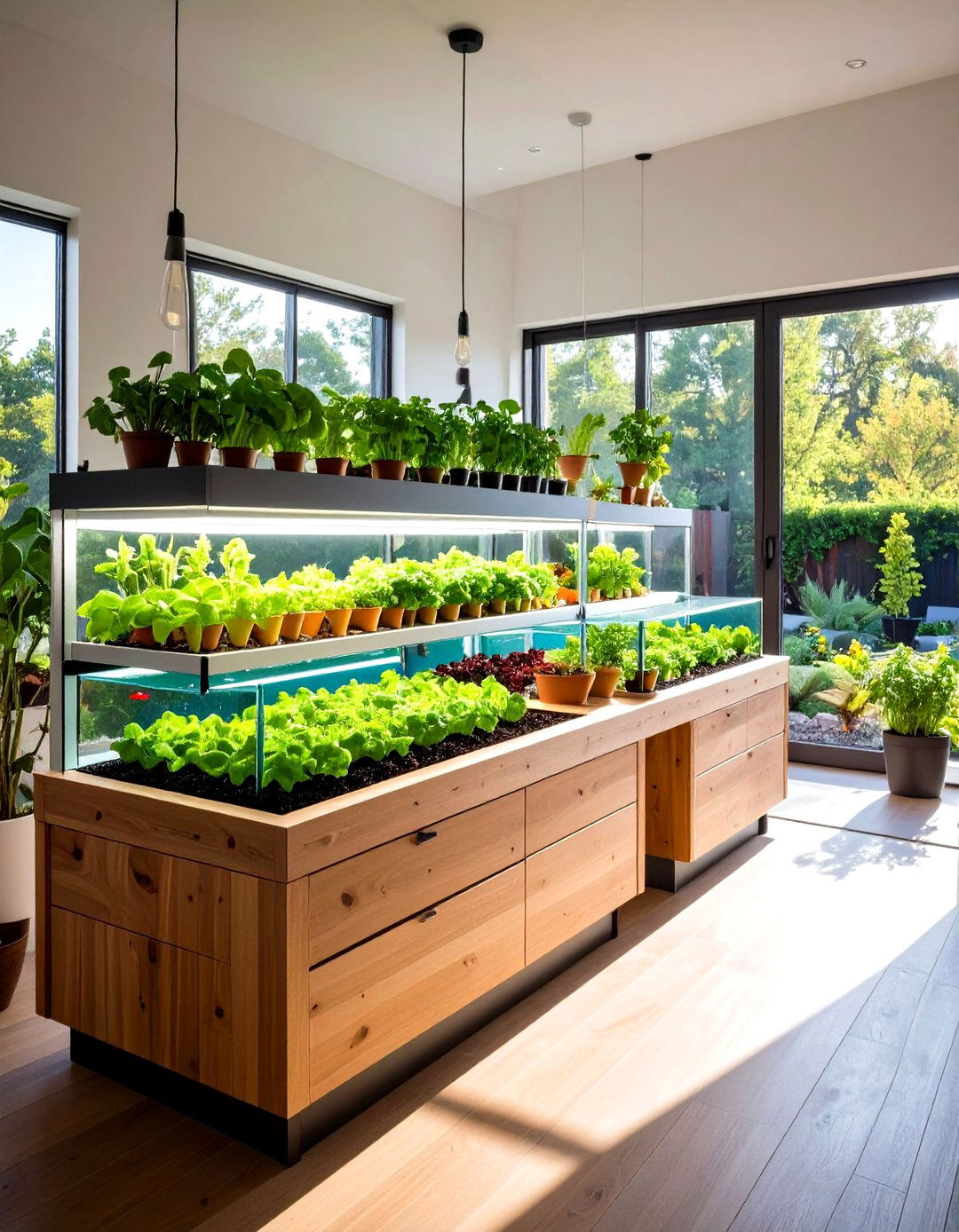
Have you considered combining fish-keeping with vegetable production in space-efficient systems that benefit both plants and aquatic life? Aquaponic growing systems use fish waste to fertilize plants while plants filter water for fish, creating sustainable growing cycles perfect for small spaces. These systems require initial setup investment but provide ongoing harvests of both vegetables and fish protein. Choose compact designs suitable for patios or indoor spaces, and select plants like lettuce, herbs, and tomatoes that thrive in nutrient-rich water culture. This approach demonstrates cutting-edge growing technology while maximizing production from minimal space through innovative biological partnerships.
18. Rolling Garden Carts
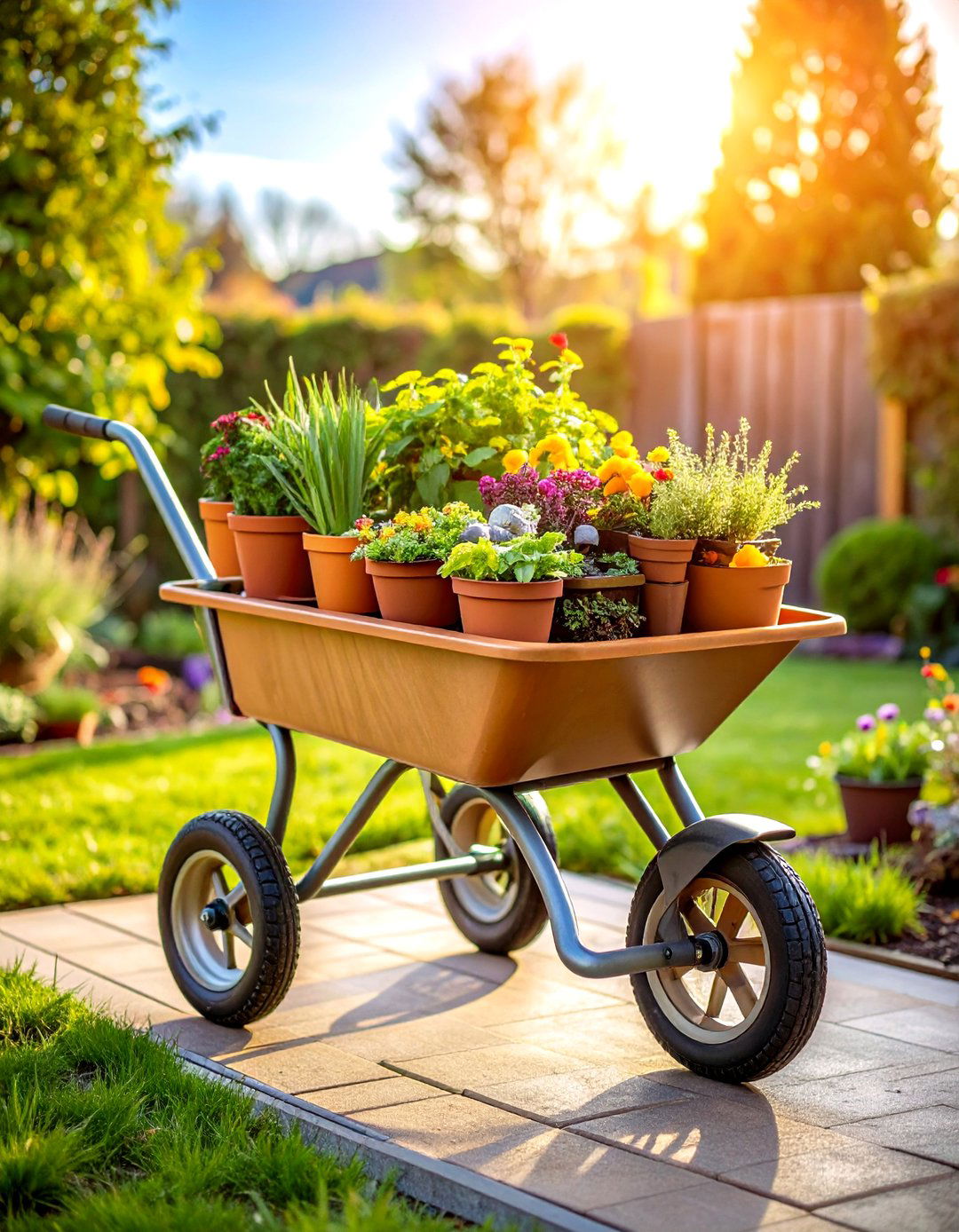
What if your entire garden could move to follow optimal sun exposure while providing maximum flexibility for small-space growing? Rolling garden carts use wheeled platforms to create mobile growing stations that adapt to changing conditions and seasonal needs. Build or purchase carts sized for your space, then arrange containers of herbs, vegetables, and flowers that can move together as units. These systems allow gardeners to optimize sun exposure, protect plants from severe weather, and reconfigure garden layouts as needed. Choose heavy-duty wheels that roll smoothly over various surfaces, and design storage areas for tools and supplies.
19. Straw Bale Mini Gardens

Could straw bales become the foundation for incredibly productive small gardens that require no digging or soil preparation? Straw bale gardens use conditioned bales as growing medium for vegetables, herbs, and flowers in spaces where traditional soil gardening isn't possible. Condition bales with nitrogen fertilizer for several weeks before planting, creating decomposed growing medium that retains moisture while providing excellent drainage. These gardens work perfectly on patios, driveways, or areas with poor soil. Plants grow directly in bales or in containers placed on top, and spent bales become excellent compost material. This method provides temporary growing solutions for renters.
20. Spiral Herb Gardens
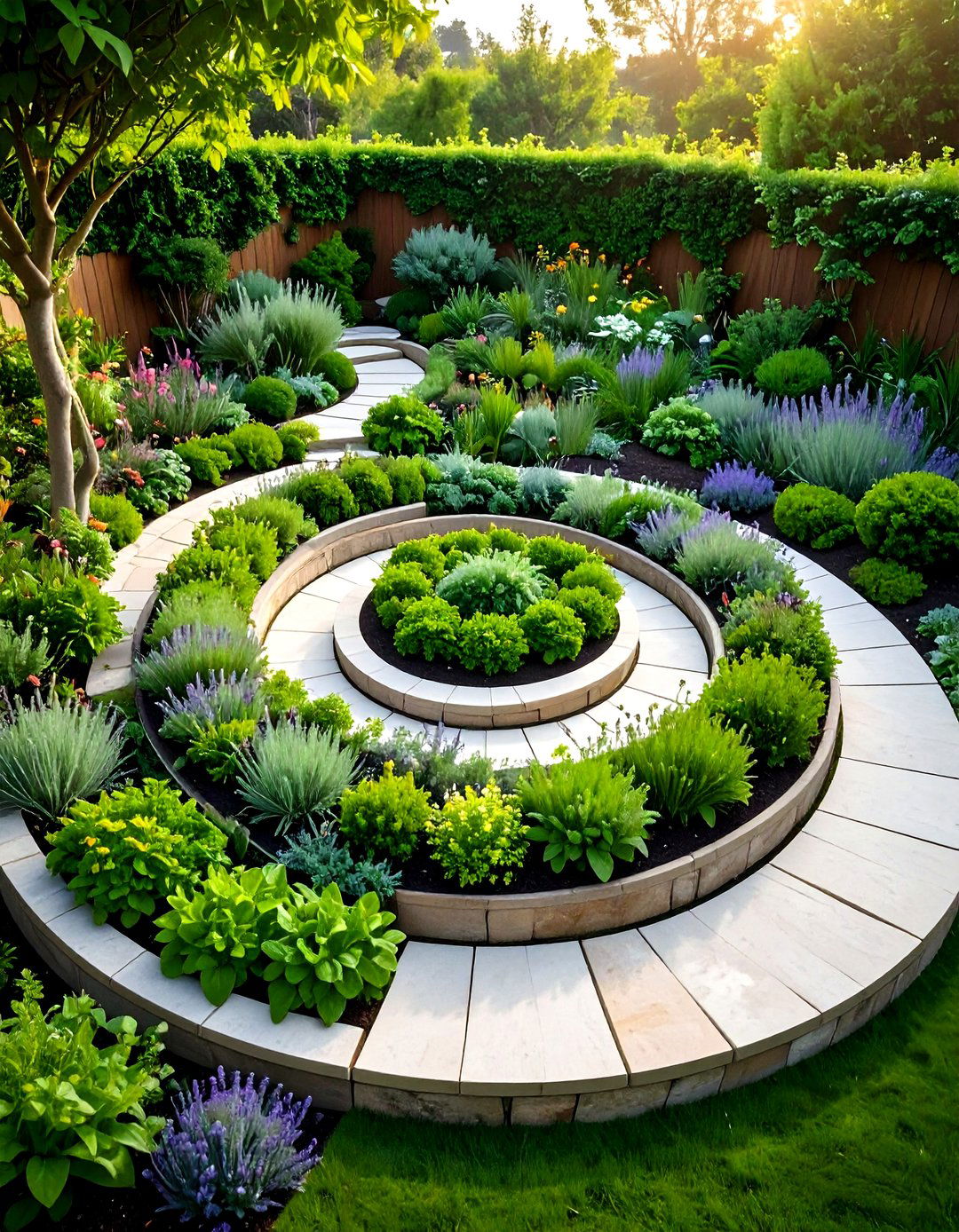
Why plant herbs in straight lines when spiral designs can maximize growing space while creating stunning garden focal points? Spiral herb gardens use curved, ascending pathways to create multiple microclimates within compact areas. Build spirals using stones, bricks, or wood, with Mediterranean herbs at the sunny top and moisture-loving varieties at the shaded base. This design provides excellent drainage at higher levels while retaining moisture in lower areas, accommodating different plant needs within single structures. The three-dimensional aspect creates visual interest while maximizing growing area. These gardens work beautifully as centerpieces for larger garden areas or as standalone features in small spaces.
21. Gutter Growing Systems

Could standard rain gutters be transformed into productive hydroponic growing systems perfect for small-space gardening? Gutter growing systems use PVC gutters with proper drainage and mounting to create space-efficient growing channels for lettuce, herbs, and strawberries. Mount systems at slight angles to ensure proper water flow, and install timer-controlled irrigation for consistent moisture. These systems work exceptionally well for balconies, patios, and areas where traditional containers aren't practical. The linear design maximizes growing length while minimizing width requirements. This approach demonstrates how everyday materials can be repurposed for innovative growing solutions that provide impressive harvests from minimal space.
22. Living Wall Partitions
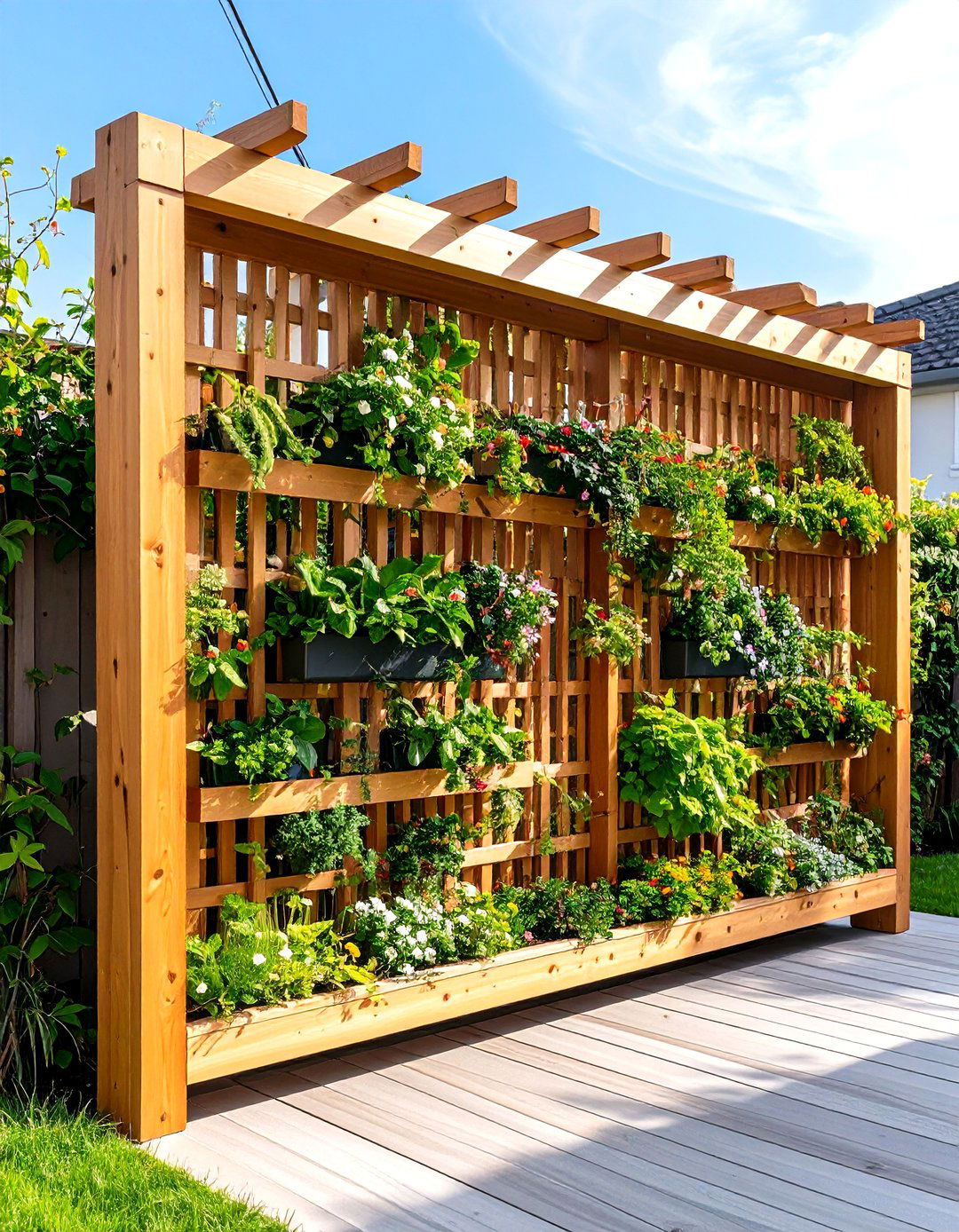
Have you considered using productive gardens as natural room dividers that provide privacy while supporting plant growth? Living wall partitions create functional barriers using trellises, frames, or freestanding structures planted with climbing vines, tall grasses, or vertical growing systems. These installations define outdoor spaces while providing growing areas for food plants or ornamental varieties. Choose plants based on desired height, density, and seasonal characteristics to create effective screening. Install irrigation systems for consistent watering, and select structures that complement your garden design. This approach proves that gardens can serve multiple functions while maximizing limited space through creative design solutions.
23. Keyhole Garden Designs

Could circular garden designs inspired by African permaculture maximize productivity while minimizing space and water requirements? Keyhole gardens use round raised beds with central composting areas that provide nutrients and water retention for surrounding plants. Build circular structures approximately six feet in diameter with keyhole-shaped access paths, allowing easy harvesting from all areas. Layer organic materials in center baskets to create ongoing compost that feeds surrounding plants. These self-sustaining systems require minimal external inputs while providing substantial harvests. The design works particularly well in dry climates and small yards where water conservation is essential. This approach demonstrates sustainable growing principles.
24. Fairy Garden Miniatures
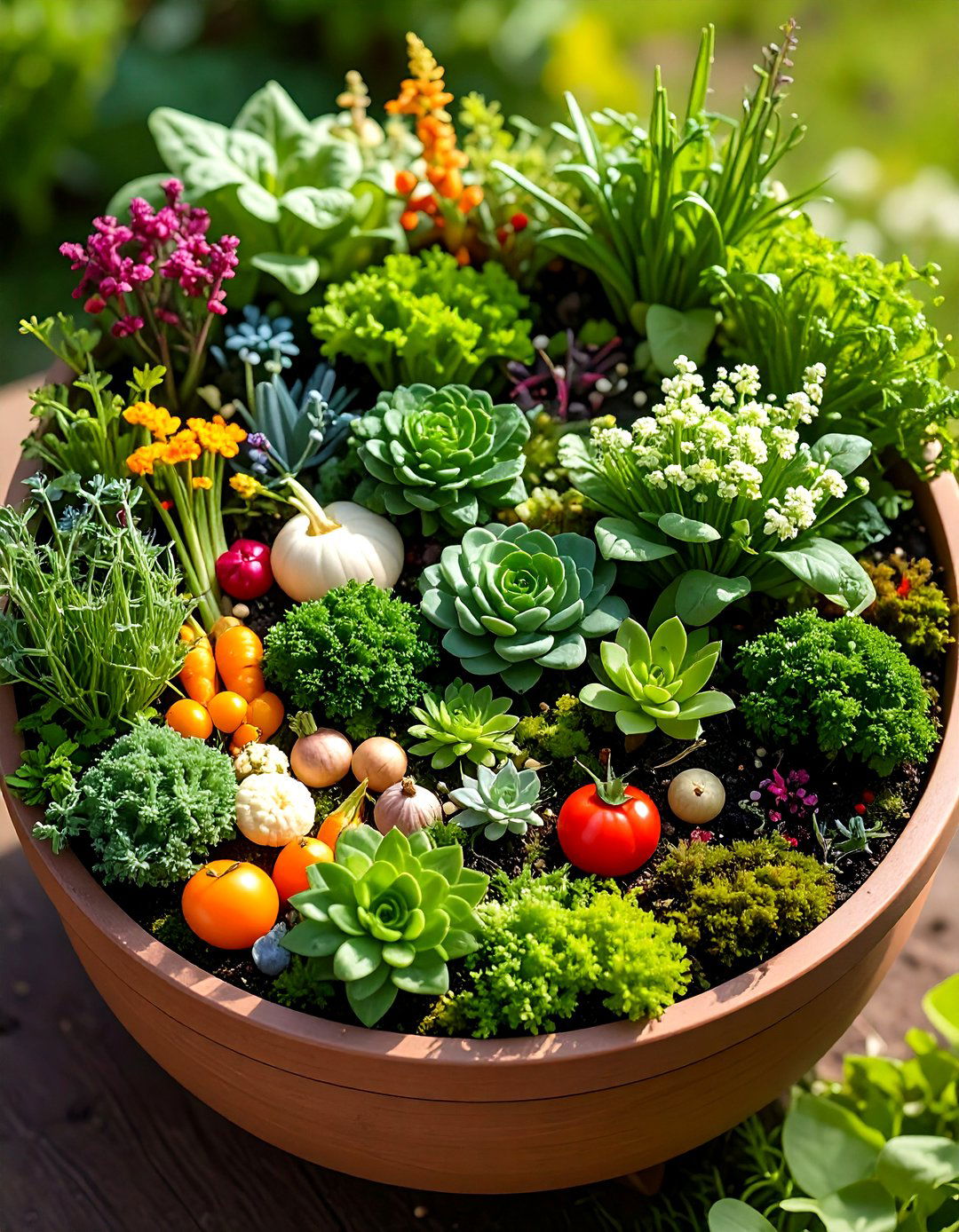
Why not create enchanting miniature landscapes that combine productive growing with whimsical charm perfect for small spaces? Fairy garden miniatures use compact containers to create themed growing areas featuring dwarf vegetables, miniature herbs, and tiny flowering plants arranged with decorative elements. These gardens work wonderfully for children's spaces, tabletop displays, or areas where standard-sized plants would overwhelm the setting. Choose plants like micro tomatoes, baby lettuce varieties, and compact herbs that remain appropriately scaled. Add miniature furniture, pathways, and structures to create storytelling elements. This approach proves that even the smallest growing spaces can provide both practical harvests and imaginative inspiration for gardeners of all ages.
Conclusion:
Small gardens prove that limited space never limits growing potential when you embrace creative solutions and thoughtful design. These twenty-four ideas demonstrate how container gardens, vertical systems, and innovative layouts can transform any compact area into productive, beautiful growing spaces. Whether you choose herb-filled window boxes, towering vertical walls, or charming fairy gardens, success depends on matching plants to available conditions while maximizing every square inch. The key lies in understanding that small gardens offer unique advantages – easier maintenance, better pest control, and the ability to create perfect growing conditions for specific plants. Start with one or two ideas that excite you most, then expand your garden as confidence and experience grow. Remember that the most rewarding gardens reflect personal style while providing practical benefits that enhance daily life.



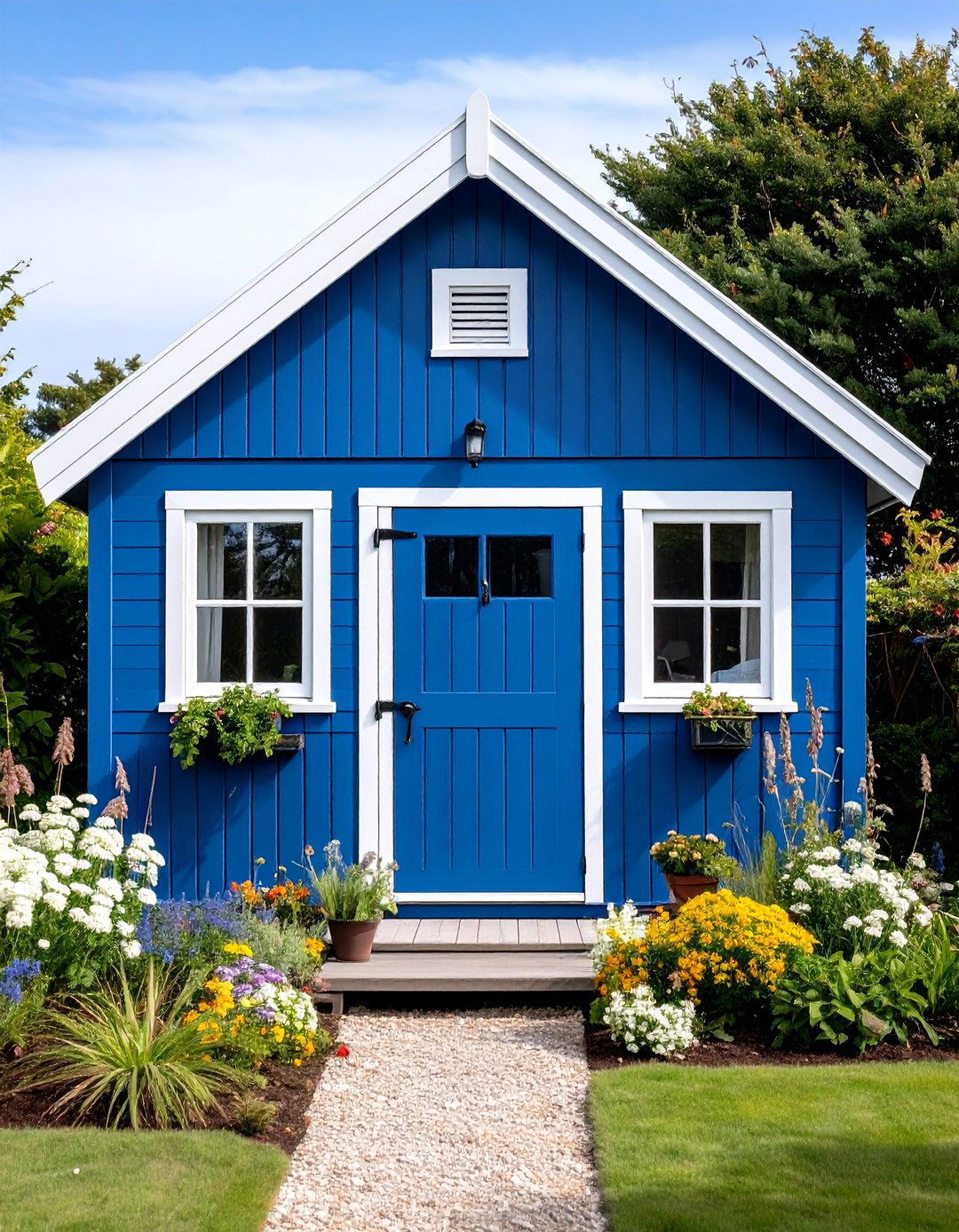

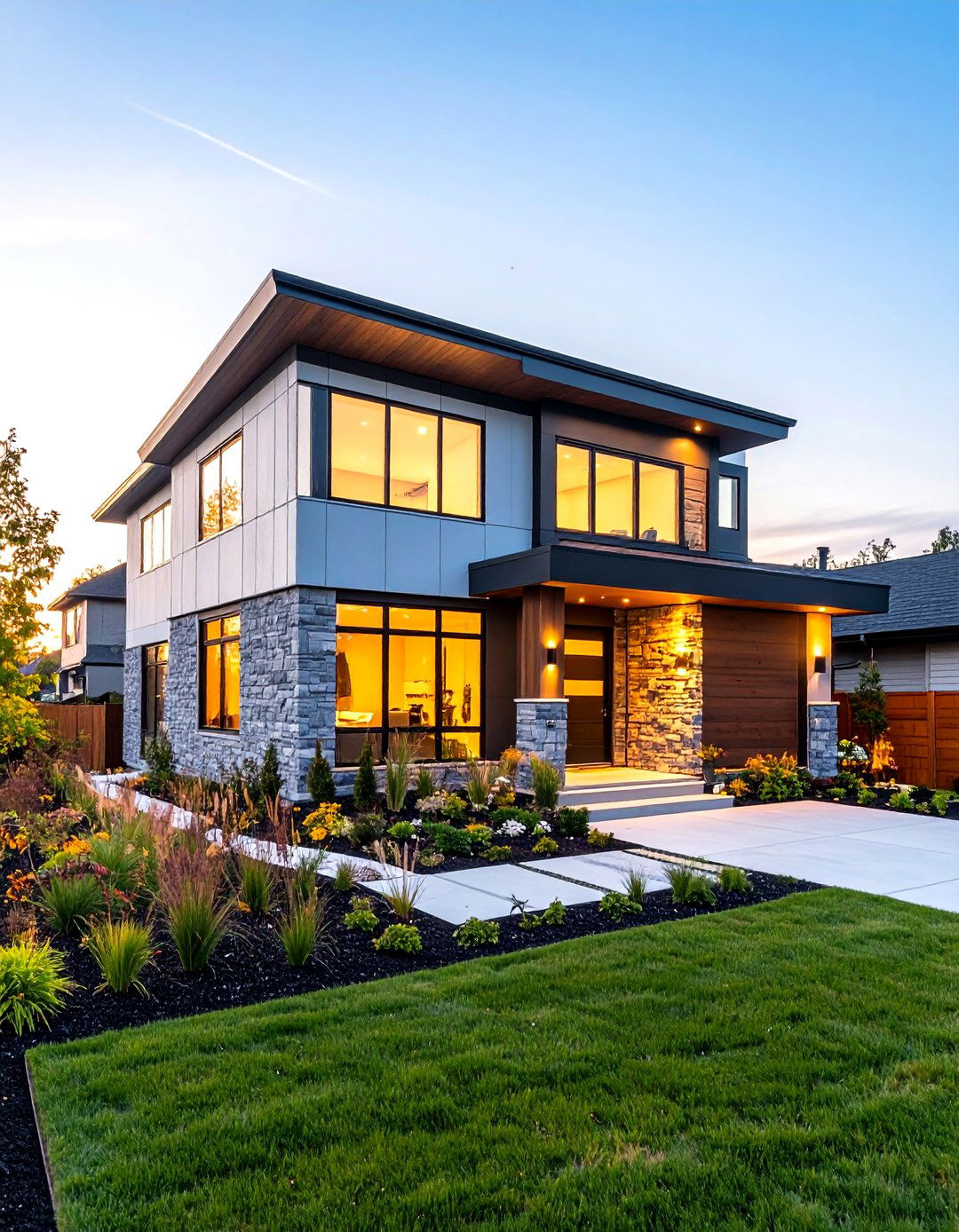
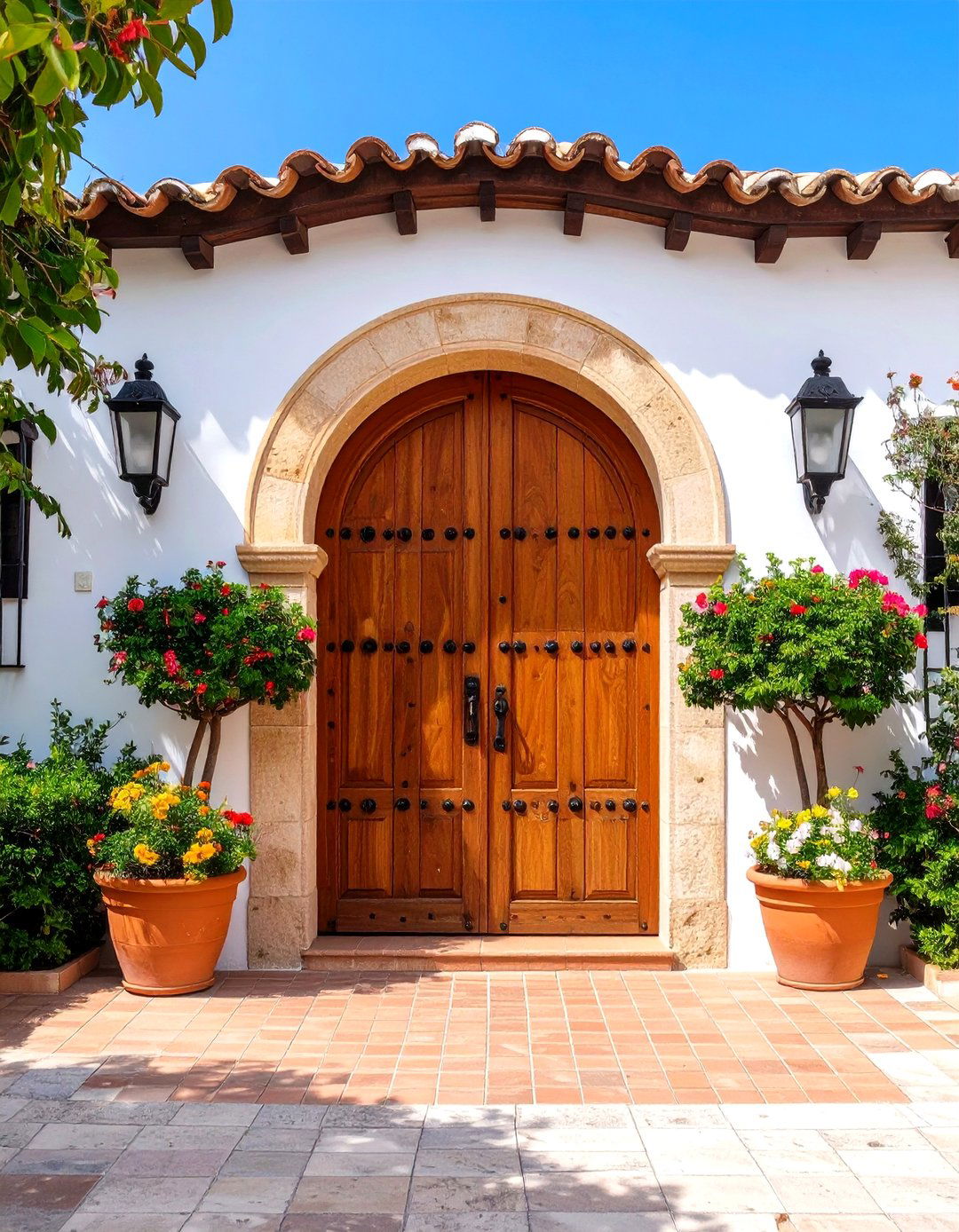





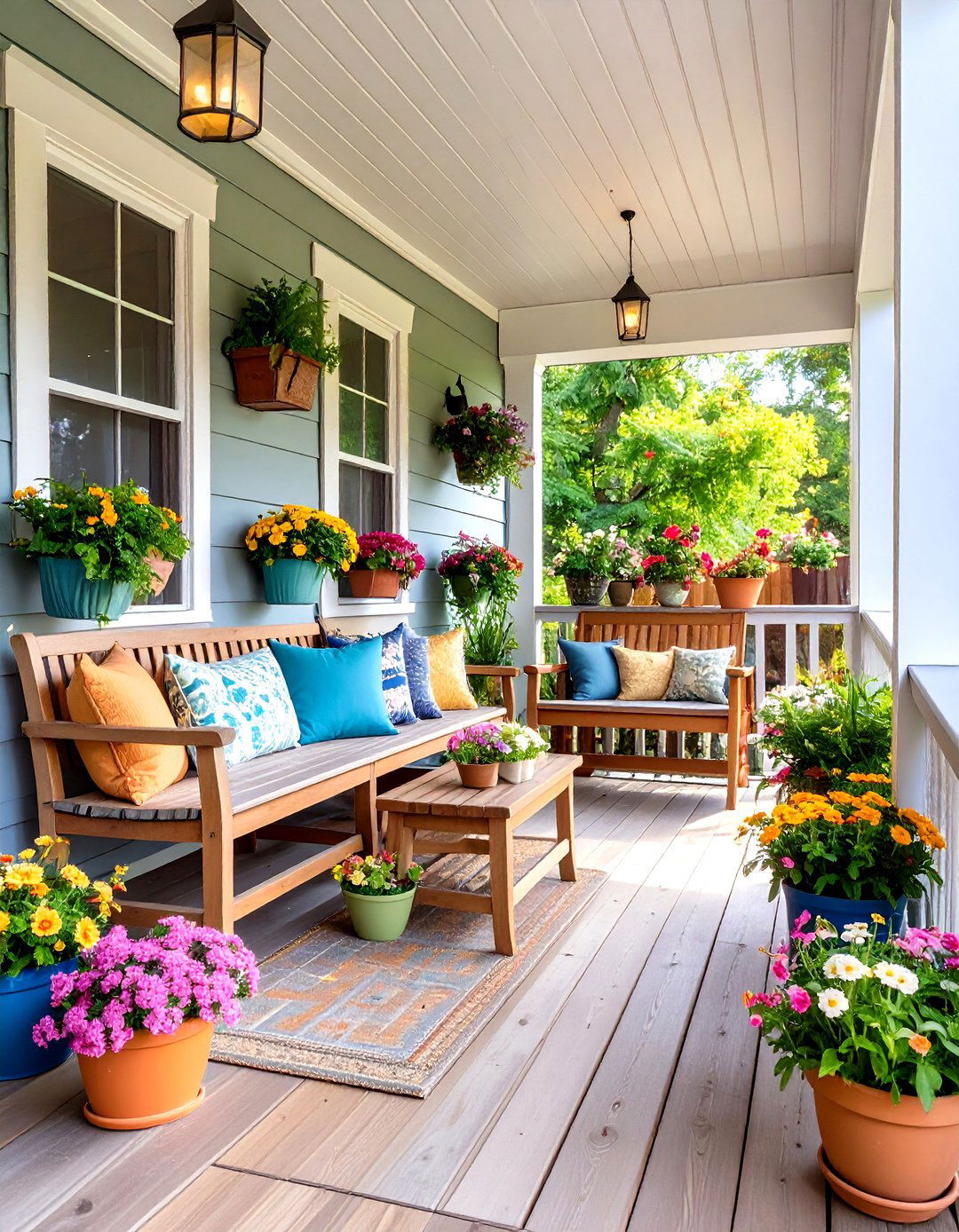

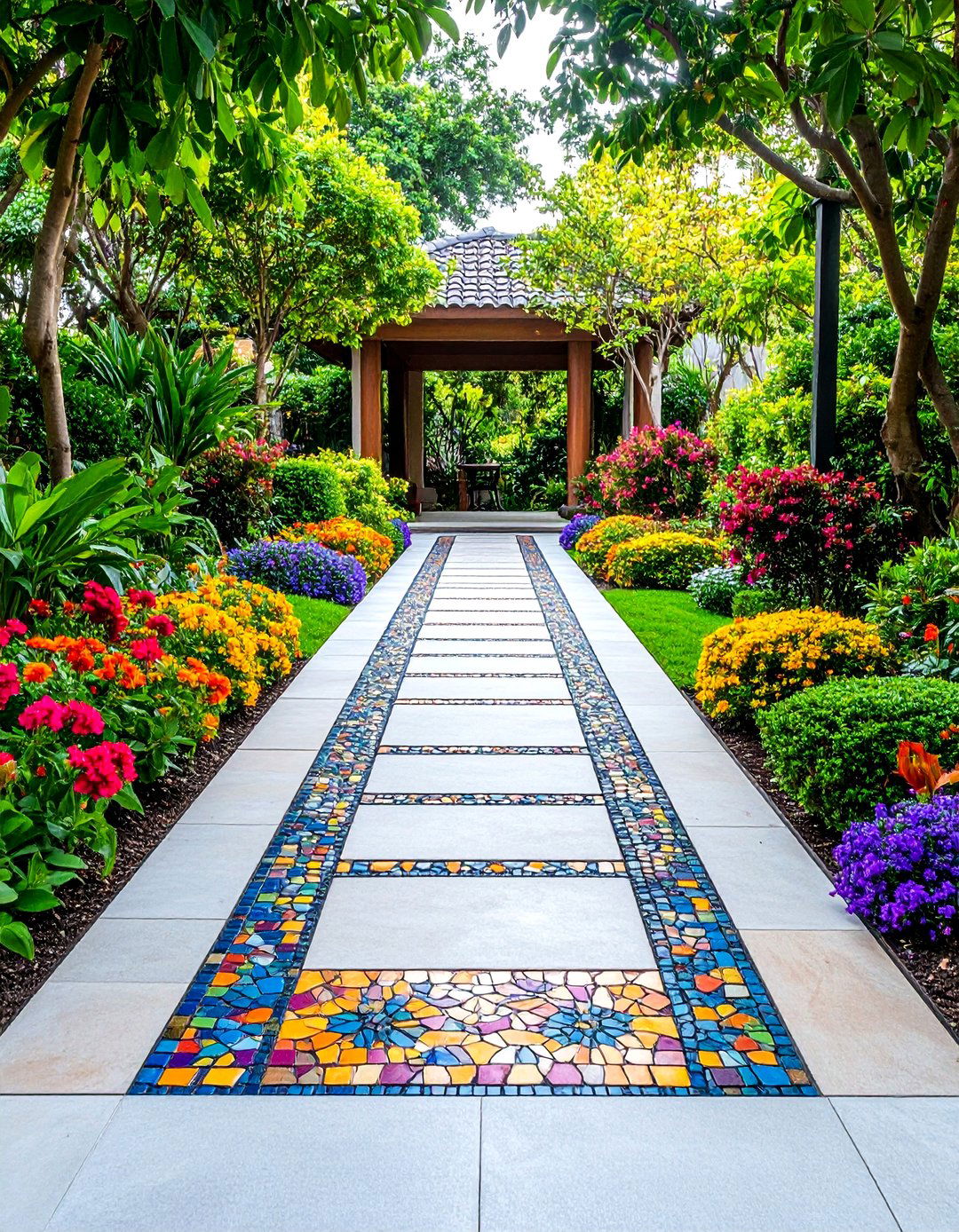
Leave a Reply